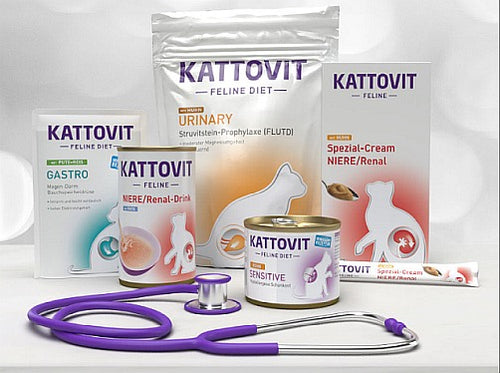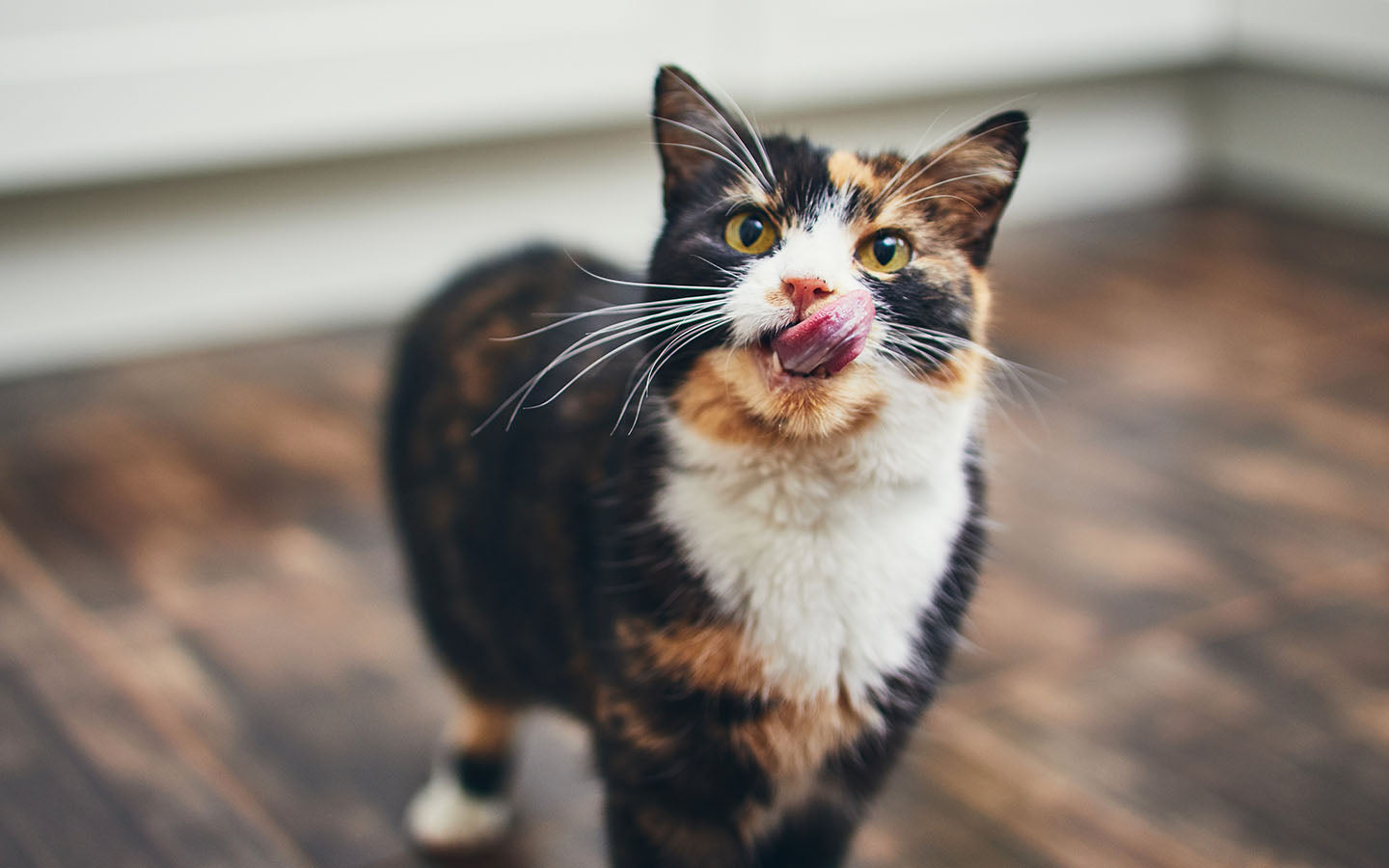The fact that a cat smacks its lips is one of the rare occurrences Cat noises . The quiet velvet paws usually only use loud noises to communicate with us humans. However, smacking is not one of the typical vocalizations - especially not when it occurs suddenly and not while eating. If your cat is trying to tell you something by smacking, is there perhaps cause for concern or is the smacking completely harmless? In this article, we will look at the possible reasons why your cat smacks its lips and explain when an illness could be behind the smacking and how you can best react.
Why a cat smacks its lips: possible causes
There are many different reasons why a cat smacks its lips. The tricky thing is that smacking can be a harmless, pleasant sound or an expression of discomfort and illness. The following direct and indirect triggers are among those that could be causing your cat to smacks its lips:
- expression of satisfaction
- hunting instinct
- malaise
- foreign body in the mouth
- nausea
- Disease of the oral cavity and/or teeth
- disease in the neck and lung area
- Other illness
[Urinary+Sensitive+Niere]
Smacking as an expression of satisfaction
The fact that your cat smacks its lips does not always have to mean something negative. If your cat eats wet food instead of dry food, it may make smacking noises when eating. But even far from eating, smacking can have a harmless background: some animals get used to the noise in situations where they feel good and satisfied Therefore, pay attention to when and how the smacking occurs: For example, does your cat smacking when cuddling or grooming and otherwise appears relaxed and perhaps even purrs? If no other symptoms or behavioral changes occur apart from the smacking, the noise is probably no cause for concern and simply means: "I'm fine!".
living out the hunting instinct
Another harmless cause for smacking can be the hunting instinct of the cat Often the animals sit for hours at the window or in the garden and observe what is going on around them. If they see an attractive snack such as a mouse or a bird, their hunting instinct is aroused. However, if the bird flies away or it is impossible to eat the animal due to the limited space, disappointed cats often make noises. These usually sound like a kind of Chattering and chattering of teeth . But smacking is also a common reaction in this context. We have more information about the typical vocalizations and communication attempts of cats in our guide on the subject cat noises summarized.
Does your cat often smack its lips in its sleep? It's not impossible that your house cat also goes on the prowl in its dreams and its mouth waters while it sleeps.
Smacking as a sign of discomfort
Just as smacking indicates contentment and is considered a feel-good sound in some cats, conversely, discomfort can also be the reason for cats to smacking. Velvet paws that suffer from stress and anxiety sometimes express this condition through nervous reactions. These include, among other things, increased licking the mouth and smacking. This is also why it is particularly important that you observe in which situations your cat smacks and how it behaves beyond that. If it shows further noticeable behavioral changes she increasingly withdraws, refuses food or behaves aggressively?
Consider whether there is anything in your cat’s life trigger of stress or anxiety. This could be, for example, new people or animals in the household, a move, rearranged furniture or even a feed change Try to minimize possible stress factors as much as possible and offer your cat a safe environment with space to retreat. If further symptoms occur and your cat does not recover, you should consider other causes and, if in doubt, consult a veterinarian.
foreign body in the mouth
The repeated opening and closing of the mouth in combination with smacking can also indicate a foreign body in the mouth This can be due to the cat's mouth. This is unpleasant and the cat wants to get rid of it quickly. However, if a blade of grass or another foreign object has become jammed in the mouth or throat, the animal may not be able to get rid of it on its own. If you suspect that there is an object in your cat's mouth, you should definitely go to the vet. Even if you cannot see anything when you look in the mouth, there may still be something jammed in the throat or nasal cavities. To avoid injuries, the vet should always examine the professional removal of the foreign body take over.
nausea
Your cat's smacking can also occur concurrently and indicate another symptom: Nausea . When you feel nauseous, your body reacts with increased Saliva production . The large amount of saliva in the mouth then causes the cat to smack its lips. Nausea is often accompanied by other symptoms such as gagging, vomiting , Diarrhea , loss of appetite and weight loss There are various possible causes: Bacterial and viral infections , Food allergies , but also diseases such as renal insufficiency or struvite stones can cause nausea and smacking, among other things. Therefore, pay close attention to accompanying symptoms and have your cat examined by a veterinarian.
Disease of the oral cavity and/or teeth
Pain and discomfort in the mouth or teeth can cause a cat to react by smacking. For example, Inflammation in the cat's mouth such as inflammation of the gums, oral mucosa or periodontitis. In the case of inflammation of the oral mucosa or gums, the affected areas are usually very red and very sensitive to pain. In addition, an insidious inflammation of the tooth roots can also occur. great pain that cause the cat to smack its lips. You cannot see an inflammation of the tooth roots with the naked eye, so if you notice any signs of it, you should have an X-ray done by your vet.
Especially in older cats, dental disease is FORL (Feline Odontoclastic Resorptive Lesions) is typical. The tooth and root tissue of the sick cat is gradually broken down, so that teeth can also fall out and break off. In addition to smacking as a reaction to the pain in the mouth, there is also an increased production of saliva, which can again result in smacking noises. You can find out more about diseases in the area of the oral cavity and teeth in our guide on the subject inflammation in the mouth read it.
disease in the neck and lung area
In addition to discomfort in the mouth, diseases of the throat and lungs These include, for example, sore throats such as laryngitis, pneumonia or tonsillitis. These are often accompanied by gagging, vomiting, cold symptoms , fatigue , Fever and loss of appetite. If you notice any of these symptoms, you should also have your cat examined by a veterinarian in order to treat the cat as best as possible and prevent the inflammation from becoming chronic.
Other diseases
Swollen lymph nodes in the neck can also cause your cat to make smacking noises. Lymph nodes are part of the body's immune system and swell when it is fighting an infection, for example. The swollen lymph nodes in the neck can feel uncomfortable for your cat and cause it to smack its lips. Swollen lymph nodes can be caused by all kinds of illnesses: In addition to the inflammations already mentioned, harmless colds are just as possible as more dangerous infections such as cat flu, feline leukemia (FeLV) or a tumor. Affected cats are usually exhausted, tired and lose their appetite. At the first signs, an examination by a vet is highly recommended.
What should I do if my cat smacks its lips?
If you notice that your cat is smacking, you should first observe when the smacking occurs and how your cat behaves otherwise. If it only smacks in situations where it is obviously happy and does not show any other changes in its behavior, the smacking is probably just an expression of its well-being. The situation is different if your house cat smacks and also seems unhappy and shows symptoms such as exhaustion, tiredness, loss of appetite, gagging, vomiting, diarrhea, fever, etc. In this case, the smacking can indicate an illness, inflammation of the teeth or gums, or an infection and should be examined by a veterinarian.
If a specific disease is present, such as struvite stones or kidney failure, you can change the food to a special diet food in consultation with your vet. Our KATTOVIT range offers special food for cats with special needs. With a recipe that is ideally tailored to the respective disease, the diet food helps to provide the best possible support to affected animals - with high-quality nutrients and good taste.









